
5 minute read
Mandatory Succession Planning Rule
The State Bar of New Mexico presents the Annual Awards to those who have distinguished themselves or made exemplary contributions to the State Bar or legal profession over the last year. The following were recognized for excellence and service on August 11 during the 2022 Annual Meeting.
Distinguished Bar Service Award: Non-Lawyer
JUAN ABEYTA
Excellence in Well-Being Award
PAMELA MOORE Judge Sarah M. Singleton Distinguished Service Award
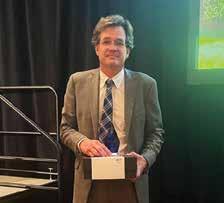
MICHAEL P. FRICKE
Justice Pamela B. Minzner Professionalism Award
Outstanding Legal Organization or Program Award
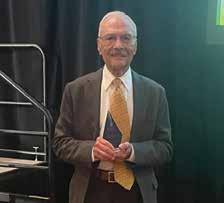
JUDGE: JAMES J. WECHSLER
ATTORNEY: QUENTIN P. RAY
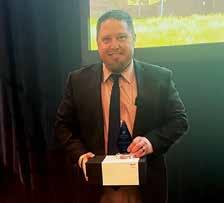
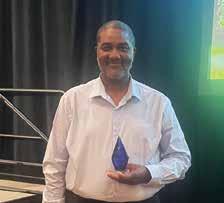

ORGANIZATION: POJOAQUE PUEBLO TRIBAL COURT
Accepted by Arthur Malone
PROGRAM: INTELLECTUAL PROPERTY PRO BONO FAIR
Ian Bezpalko (left), Svitlana Anderson, Jose Garcia, Jeff Albright and Justin Muehlmeyer
Outstanding Young Lawyer of the Year Award Robert H. LaFollette Pro Bono Award Seth D. Montgomery Distinguished Judicial Service Award

LAUREN E. RILEY DARLENE T. GOMEZ
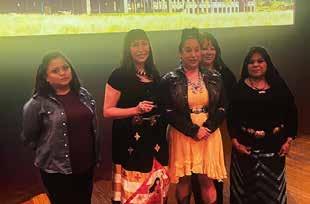
Pictured second from left JUDGE HENRY A. ALANIZ
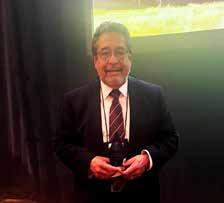
Past Presidents
President’s Award
We were lucky to have 13 past presidents of the State Bar attend the Annual Meeting.

From left to right: Wesley Pool, Scotty Holloman, Hon. Henry Alaniz (ret.), Andrew Cloutier, David Hernandez, Jerry Dixon, Erika Anderson, Dan O’Brien, Dennis Jontz, Hon. Alan Torgerson (ret.), Jessica Perez, Carla Martinez, Charles Vigil, and President Carolyn Wolf.

Each year, the president chooses an individual or individuals to honor for their service to the State Bar. President Carolyn Wolf chose to recognize Paula Tackett and Brenda Castello for their contributions and work with the NM Compilation Commission.
Equity in Justice ASK Amanda
Dear Amanda,
Why are there so very few Native American state court judges who are from a New Mexico tribe, nation, or pueblo or have a Federal Indian law background. What, if anything, is the New Mexico Supreme Court doing to change this to allow for more Native American inclusion on the state judiciary because a significant portion of the state’s population identifies as Native American and large swaths of Indian Country are contained within the state of New Mexico?
Dear Member,
The historical and current exclusion of Native Americans from positions of power in our state and nation is something that must be addressed. It is difficult to see our society as equal when there is not equitable representation in the judiciary. Judges make decisions on cases, laws, and interpret the constitution. When judges do not reflect the population they are presiding over, it can be perceived as unfair, and viewing the judiciary as unfair chips away at the public’s faith that justice will be served for everyone.
Currently, 24 states do not have any people of color on their supreme court and that includes eight states where people of color are at least a quarter the state’s population1 . At a national level, 73% of the federal judges are men and 80% are white2. In New Mexico, where 10% of the population identifies as Native American, only 4% of our judges identify as such, and that has remained steady since 2009, indicating little progress from 2009-20193 .
There are also fewer Native American law students. Our data from 2009 showed Native American students at 13%, but our most recent data from 2019 shows that it has dropped to 7%. There are programs to support Native American law students, and mentorship has shown to have a positive impact on bar exam passage rates, but a more concerted effort needs to be made to recruit and support Native Americans at the law school, in the profession and state and federal courts. The Judicial Clerkship Program she mentioned is an initiative that began in 2021 that recruits law students from historically underrepresented and excluded groups for judicial clerkships. Since the beginning of the program, 18%-33% of the students who have been placed identify as indigenous or Native American. By the time this article is published, another cohort will be placed for the summer of 2023.
Chief Justice Bacon and Justice Vargas are also leading efforts with “So, You Want to be a Judge?,” a new statewide program that encourages lawyers from diverse backgrounds to consider the bench and has programming that will prepare lawyers for interviews and what is involved in becoming a judge.
We also need to examine the process for becoming a judge to see where it may be privileging some people over others. In order to recruit judges from diverse backgrounds, there needs to be formalized mechanisms. We cannot just rely on voluntary efforts when it comes to any equity issue, and this is one where we need new policies and practices. Conversations about recruitment and barriers to the judiciary are taking place, and as the Equity in Justice Program Director at the State Bar, I encourage you to reach out to me to keep this conversation going. ■
Steps are being taken
There are several efforts under way to build a pipeline to the judiciary, however, they do not specifically target Native Americans. I reached out to Chief Justice Shannon Bacon to see what she could tell us about Supreme Court efforts. She said, “the Supreme Court has established both the Judicial Clerkship Program and the Equity and Justice Commission to address the need for a more diverse bar and judiciary. A judiciary that reflects the population it serves is critical to the public’s trust and confidence in our branch of government.”
Dr. Amanda Parker is the Equity in Justice Director at the State Bar of New Mexico. To submit a question to Ask Amanda or find out more about the program go to www.sbnm.org/eij.
____________________ Endnotes 1 Research Report, Brennan Center for Justice, State Supreme Court Diversity, July 23,2019 https://www. brennancenter.org/our-work/research-reports/state-supreme-court-diversity 2 Research Report, Brennan Center for Justice, State Supreme Court Diversity, July 23,2019 https://www. brennancenter.org/our-work/research-reports/state-supreme-court-diversity 3 The New Mexico State Bar Association 2019 Gender Diversity Report (American Decisions, 2020).
Ask your questions about diversity, equity, and inclusion issues in the office, courtroom, and larger society at www.sbnm.org/eij


